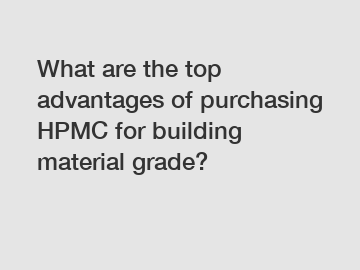What are the top advantages of purchasing HPMC for building material grade?
What are the top advantages of purchasing HPMC for building material grade?
Building materials play a crucial role in the construction industry, as they determine the strength, durability, and overall quality of any structure. One material that has gained significant popularity in recent years is Hydroxypropyl Methylcellulose (HPMC). HPMC is a versatile and high-performing compound used in various applications, including as a building material grade. In this article, we will explore the top advantages of purchasing HPMC for building material grade.
Improved Workability and Flexibility.

One major advantage of using HPMC in building materials is its ability to improve workability and flexibility. HPMC acts as a thickening agent, enhancing the consistency and workability of mortar, cement, and other construction materials. It helps achieve better adhesion and cohesion, making the material more easily spreadable and malleable. This enables builders and contractors to work more efficiently, saving time and effort during the construction process.
Enhanced Water Retention.
Another significant advantage of HPMC in building materials is its excellent water retention properties. HPMC can absorb and retain a considerable amount of water, preventing premature evaporation and ensuring that the building material remains hydrated for an extended period. This is particularly useful in environments with high temperatures or low humidity, helping to maintain the integrity and performance of the material during curing and drying phases.
Increased Bonding Strength.
HPMC also improves the bonding strength of building materials, such as mortars and renders. Its unique properties enable the material to adhere strongly to various substrates, including bricks, concrete, and masonry. This results in enhanced durability and long-term performance of the structure. With increased bonding strength, the risk of cracking, spalling, and other forms of structural damage is significantly reduced.
Improved Crack Resistance.
Cracks in buildings are a common problem that can lead to water leakage, structural instability, and compromised aesthetics. HPMC helps address this issue by providing improved crack resistance to building materials. The compound's ability to enhance flexibility and bonding strength prevents the formation and propagation of cracks, ensuring the longevity and integrity of the structure. By reducing the occurrence of cracks, repairs and maintenance costs are minimized, ultimately resulting in cost savings for builders and homeowners.
Enhanced Thermal and Acoustic Insulation.
In addition to its mechanical properties, HPMC offers improved thermal and acoustic insulation when used in building materials. HPMC helps reduce heat transfer, enhancing energy efficiency and lowering heating and cooling costs. It also provides effective sound insulation, minimizing noise transmission between rooms or from external sources. This makes HPMC an ideal choice for construction projects that require comfortable and environmentally-friendly living spaces.
Conclusion:
In conclusion, purchasing HPMC for building material grade offers numerous advantages for construction projects. From improved workability and flexibility to enhanced water retention, bonding strength, and crack resistance, HPMC plays a vital role in enhancing the performance and durability of building materials. Additionally, its thermal and acoustic insulation properties add further value to any construction project. To experience these advantages and harness the benefits of HPMC, it is vital to source it from reliable manufacturers and suppliers. If you are interested in purchasing HPMC for your building material needs, please contact us for further information and assistance.
[Contact us for further information and assistance.].
For more information, please visit gypsum retarder chemical, hpmc powder factory, ceramic adhesives hpmc exporter.
240
0
0

Comments
All Comments (0)